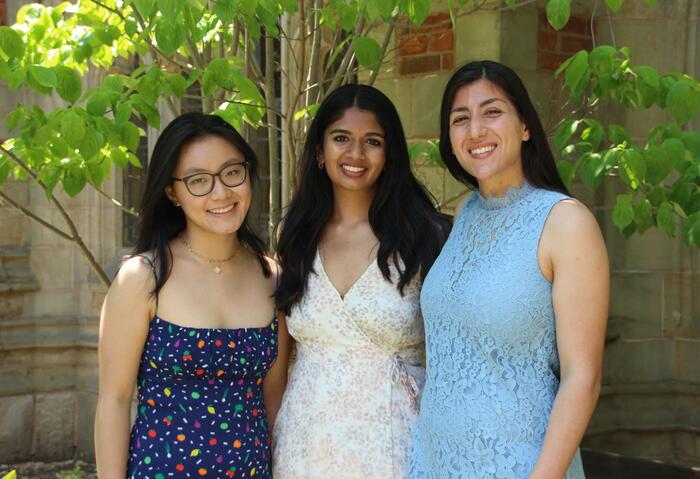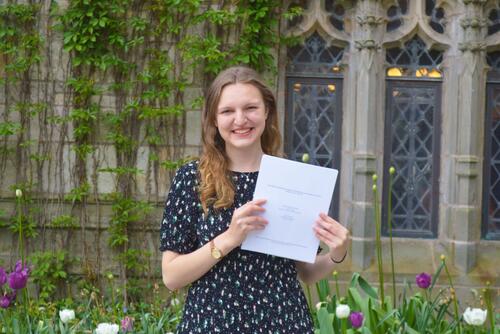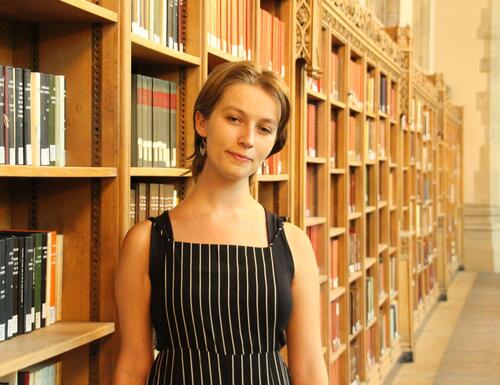Photo: Logan Howard, winner of the Library Map Prize.
In spite of ongoing pandemic-related challenges during the last year, the class of 2021 accomplished a wide range of original research projects using Yale University Library’s collections and resources. Six students wrote senior essays that were recognized with one of three annual library prizes. The winning essays have been published on Eli Scholar.
The Harvey M. Applebaum ’59 Award is for an essay using the library’s collections of government documents and information. This year, a first prize of $500, a second prize of $250 and an honorable mention of $150 were awarded. Many of this year’s essays examined policy inequities in topics such as the history of Black women's reproductive health, the relationship between freedom and resistance for Black people during and after the Civil War, regulatory agency capture, environmental justice and energy subsidies, U.S. consumer culture and regulation of prices, and the 1912 Cuban Race War.
The Applebaum Award is chaired by Kenya Flash, government information librarian. The 2021 submissions were judged by Barbara Esty, data librarian; Cate Kellett, catalog librarian; Scott Matheson, associate librarian for Technical Services; Melissa Grafe, the John R. Bumstead Librarian for Medical History; and Jennifer Snow, librarian for anthropology, sociology, and women, gender, and sexuality studies, producing these results:
First prize: Aakshi Agrawal, Pauli Murray College, a Political Science major, for “Regulatory Agency Capture: How the Federal Energy Regulatory Commission Approved the Mountain Valley Pipeline.” Michael Fotos, director of undergraduate studies for Environmental Studies and lecturer in Political Science, was Aakshi’s senior essay advisor. Read Aakshi’s essay here.
Second prize: Trinidad Kechkian, Pierson College, an Environmental Studies major, for “An Equitable Transformation of the Energy System: The Role of State-Level Incentives for Distributed Energy Resources.” Trinidad’s senior essay advisor was Professor Robert Klee, lecturer at Yale School of the Environment. Read Trinidad’s essay here.
Honorable mention: Angela Xiao, Jonathan Edwards College, a History major, for “Battling over Bargain-Hunting: Defining the American consumer through mass-consumption shopping practices, 1909-1915.” Angela’s essay advisor was Professor Beverly Gage, professor of History & American Studies and the Brady-Johnson Professor of Grand Strategy. Read Angela’s essay here.
From left to right: Angela Xiao, Aakshi Agrawal, Trinidad Kechkian, the winners of this year's Applebaum awards.

The Manuscripts and Archives Diane Kaplan Memorial Prize awards $500 for an essay based substantially on research in any Yale Manuscripts and Archives collection.
The Kaplan Prize is chaired by Bill Landis, associate director for Public Services. Jennifer Coggins, archivist for collection development; Mike Lotstein, university archivist; Joshua Cochran, archivist for American Diplomacy; Michelle Peralta, resident archivist for Yale Special Collections; and Jessica Quagliaroli, archivist for Architectural Records, also served as judges for this year’s essay submissions.
Nathalie J. Bussemaker, Morse College, a major in Global Affairs and History, for “Imperialism’s Stepchild: Dura-Europos and the Political Uses of Archaeology in the French Mandate of Syria, 1920-1939.” Professor Jonathan Wyrtzen, associate professor of Sociology, History, and International Affairs was Nathalie’s senior essay adviser. “Nathalie’s senior essay is a strong, fascinating study of the geopolitical uses of archaeology in Syria as it was emerging as an independent country from French colonial administration. She makes particularly creative use of the personal papers of Yale faculty members involved in the Dura-Europos excavation, as well as the Yale presidential records of James Rowland Angell, to analyze and explore the meanings of the archaeological endeavor in the larger context of interwar global politics and imperialism.” Read Nathalie’s essay here.
Nathalie Bussemaker, winner of the Diane Kaplan Memorial Prize.

The Library Map Prize recognizes the best use of maps in a senior essay or equivalent project. This year, a first prize of $500 and an honorable mention of $250 was awarded. The Map Prize is chaired by GIS librarian Miriam Olivares. This year’s judges were Brandon Milliate, librarian for South and Southeast Asian studies; Catherine DeRose, manager of the library’s Digital Humanities Lab; Kayleigh Bohemier, librarian for science research support; Kelly Blanchat, librarian for undergraduate teaching and outreach; Lori Bronars, life sciences librarian; and Rachel Sperling, librarian for environmental studies.
First prize: Logan Howard, Ezra Stiles College, an Environmental Studies major for "Heat Stress in Urban Environments: A Case Study of Heat Vulnerability in New Haven, CT.” The judges said Howard’s essay showed “remarkably well-thought out cartographic reasoning” with maps that were “seamlessly integrated into the body of the paper” giving readers a detailed view of the factors that contribute to temperature anomalies in New Haven. Read Logan’s essay here.
Honorable mention: Nora Heaphy, Morse College, an Ecology and Evolutionary Biology major for "Climate Niche Evolution in C4+CAM Portulaca and Closely Related C3+CAM Lineages.” The judges commented on the essay’s strong cartographic design, rigorous attention to detail and effective display of geospatial data. Read Nora’s essay here.
Nora Heaphy, honorable mention for the Library Map Prize.
